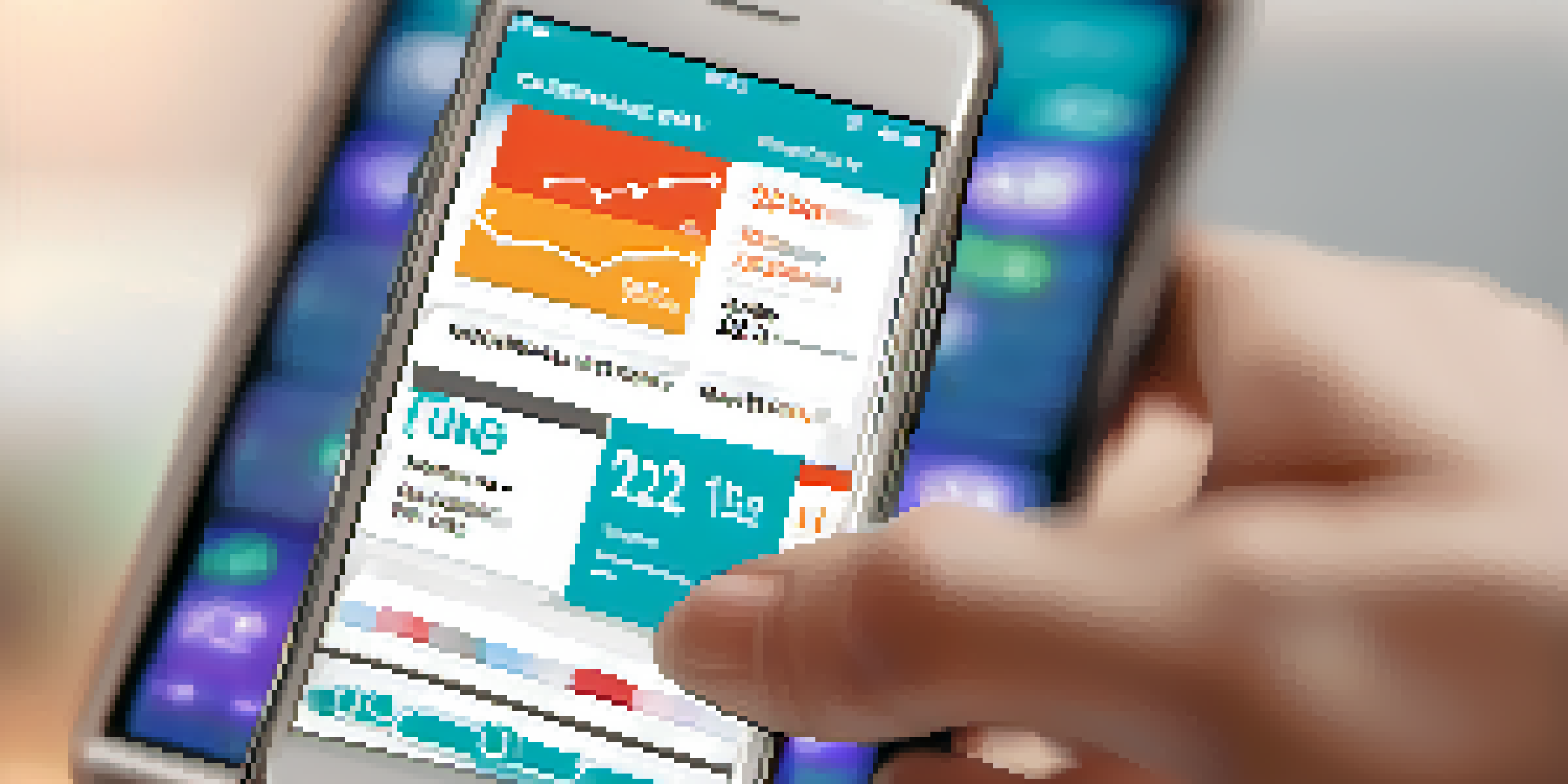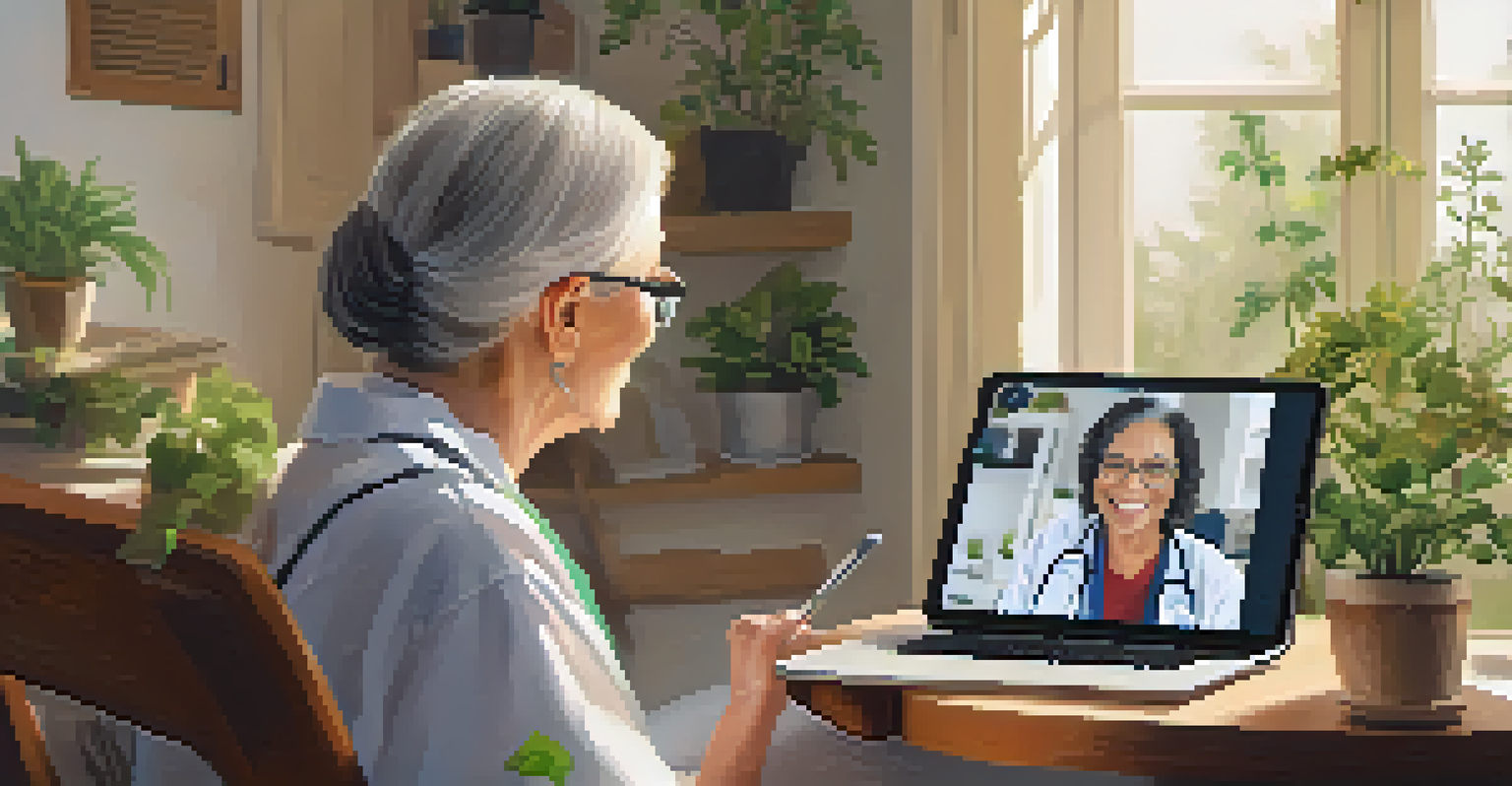Smartphones in Healthcare: A Double-Edged Sword

The Rise of Smartphones in Healthcare
Smartphones have revolutionized the healthcare landscape, making medical information accessible at our fingertips. Patients now have the ability to track their health metrics, schedule appointments, and communicate with healthcare providers—all through a device they carry daily. This convenience can lead to better health management, as individuals are more engaged in their wellness journeys. As technology continues to advance, the integration of smartphones in healthcare will likely expand even further.
The best way to predict the future is to invent it.
Telemedicine has become a prominent example of how smartphones enhance healthcare. Patients can consult with doctors via video calls, eliminating the need for often time-consuming visits. This not only saves time but also allows for greater flexibility in accessing medical advice, especially for those living in remote areas. The ease of use and efficiency provided by smartphones has shifted how we think about healthcare delivery.
However, while the advantages are clear, this shift also comes with its own set of challenges. With so much personal health information stored on devices, concerns about privacy and data security have emerged. As we embrace the benefits of smartphone technology, it's essential to address these risks to ensure that patient information remains confidential and secure.
Improved Patient Engagement Through Apps
Healthcare apps have become a game-changer in fostering patient engagement. These applications allow users to monitor their health, set medication reminders, and even communicate directly with their healthcare teams. This level of interaction helps patients take charge of their health, leading to better outcomes and adherence to treatment plans. For instance, a diabetes management app can help users track their blood sugar levels and receive personalized feedback.

Moreover, gamification in health apps can motivate users to stick to their health goals. By turning health management into a game, users are often more willing to participate and remain consistent. This can be particularly beneficial for chronic conditions where ongoing management is crucial. When patients are empowered to track their progress and celebrate small victories, it fosters a sense of ownership over their health.
Smartphones Enhance Healthcare Access
Smartphones facilitate telehealth services, allowing patients to consult healthcare professionals from their homes, breaking down geographical barriers.
However, not all patients are tech-savvy or have access to smartphones, which can exacerbate health disparities. Those who are less comfortable with technology may find it difficult to navigate these tools effectively. It's vital for healthcare providers to offer support and alternative methods for patient engagement, ensuring that no one is left behind in this digital shift.
Telehealth: Expanding Access to Care
Telehealth services have surged in popularity, largely driven by smartphone technology. These services enable patients to connect with healthcare professionals from the comfort of their homes, breaking down geographical barriers to care. For individuals in rural areas or those with mobility issues, telehealth can be a lifesaver, providing them with access to specialists they might not otherwise see.
Technology is best when it brings people together.
Additionally, telehealth has proven invaluable during public health crises, such as the COVID-19 pandemic. It allowed healthcare systems to continue operating while minimizing the risk of infection through in-person visits. Patients could receive timely care without the need to leave their homes, showcasing the flexibility and responsiveness of telehealth solutions through smartphones.
Nonetheless, the effectiveness of telehealth heavily relies on a stable internet connection and adequate device functionality. In low-income or underserved communities, these resources may be lacking, resulting in unequal access to essential healthcare services. As we look to the future, addressing these disparities will be crucial for ensuring that telehealth remains an equitable solution for all.
Data Security Concerns in Mobile Health
With the increasing reliance on smartphones for health management, data security has become a pressing concern. Personal health information is often stored on mobile devices, making it vulnerable to breaches and unauthorized access. Cybersecurity threats can jeopardize patient privacy, leading to serious consequences for individuals and healthcare providers alike.
Many health apps and services may not have robust security measures in place, leaving sensitive information exposed. As healthcare organizations adopt more smartphone-centric solutions, prioritizing data protection is paramount. Regular audits, encrypted communications, and user education on data security can help mitigate these risks and build patient trust.
Apps Boost Patient Engagement
Healthcare apps empower patients to monitor their health and manage their conditions, leading to better outcomes through increased engagement.
Moreover, regulatory frameworks like HIPAA (Health Insurance Portability and Accountability Act) play a critical role in safeguarding patient information. Ensuring compliance with these regulations is essential for any healthcare technology that handles personal data. As the digital landscape evolves, staying ahead of potential security threats will be vital to maintaining the integrity of healthcare systems.
The Role of AI in Smartphone Healthcare Apps
Artificial Intelligence (AI) is making waves in the realm of smartphone healthcare applications. From symptom checkers to personalized health recommendations, AI enhances the user experience by providing tailored insights based on individual data. This technology can analyze vast amounts of information quickly, helping users make informed decisions about their health.
For instance, AI algorithms can identify patterns in a user's health data, alerting them to potential issues before they escalate. This proactive approach to health management empowers users to seek help when necessary, potentially preventing serious health complications. Additionally, AI can streamline administrative tasks for healthcare providers, allowing them to focus more on patient care.
However, the reliance on AI also raises questions about accuracy and accountability. As users place their trust in these applications, it’s crucial to ensure that the information provided is reliable and based on sound medical practices. Ongoing research and validation of AI tools will be essential as we move forward in integrating this technology into healthcare.
Challenges of Over-reliance on Smartphone Technology
While smartphones offer incredible advantages in healthcare, there's a risk of becoming overly reliant on technology. Some patients may start to depend solely on mobile apps for medical advice instead of consulting healthcare professionals. This shift can lead to misdiagnoses or delays in receiving appropriate care, as technology should complement, not replace, traditional medical practices.
Furthermore, the constant influx of health information can overwhelm users, leading to anxiety and confusion. With so many apps available, it can be challenging to discern which sources are credible. This saturation of information may cause patients to second-guess their symptoms or treatment plans, ultimately hindering their health management efforts.
Data Security is Crucial
As reliance on smartphones grows, ensuring the security of personal health information is essential to protect patient privacy and maintain trust.
To counteract these risks, it's essential to promote a balanced approach to smartphone use in healthcare. Encouraging patients to engage with their healthcare providers while utilizing technology can lead to more informed decisions. By fostering this synergy between tech and traditional care, we can optimize health outcomes.
The Future of Smartphones in Healthcare
Looking ahead, the role of smartphones in healthcare is poised for continued evolution. As technology advances, we can expect even more innovative solutions that enhance patient care and improve health outcomes. From wearable devices that sync with mobile apps to advanced telehealth platforms, the future holds exciting possibilities for healthcare delivery.
Moreover, the integration of smartphones with emerging technologies like Augmented Reality (AR) and Virtual Reality (VR) could transform patient education and treatment approaches. Imagine a world where patients can visualize their treatment plans or practice procedures in a virtual environment. Such advancements could lead to greater understanding and compliance among patients.

However, as we embrace these new technologies, it's essential to remain vigilant about the challenges they bring. Balancing innovation with patient safety and data security will be crucial. By fostering an environment where technology and healthcare work hand-in-hand, we can create a brighter future for patients and providers alike.